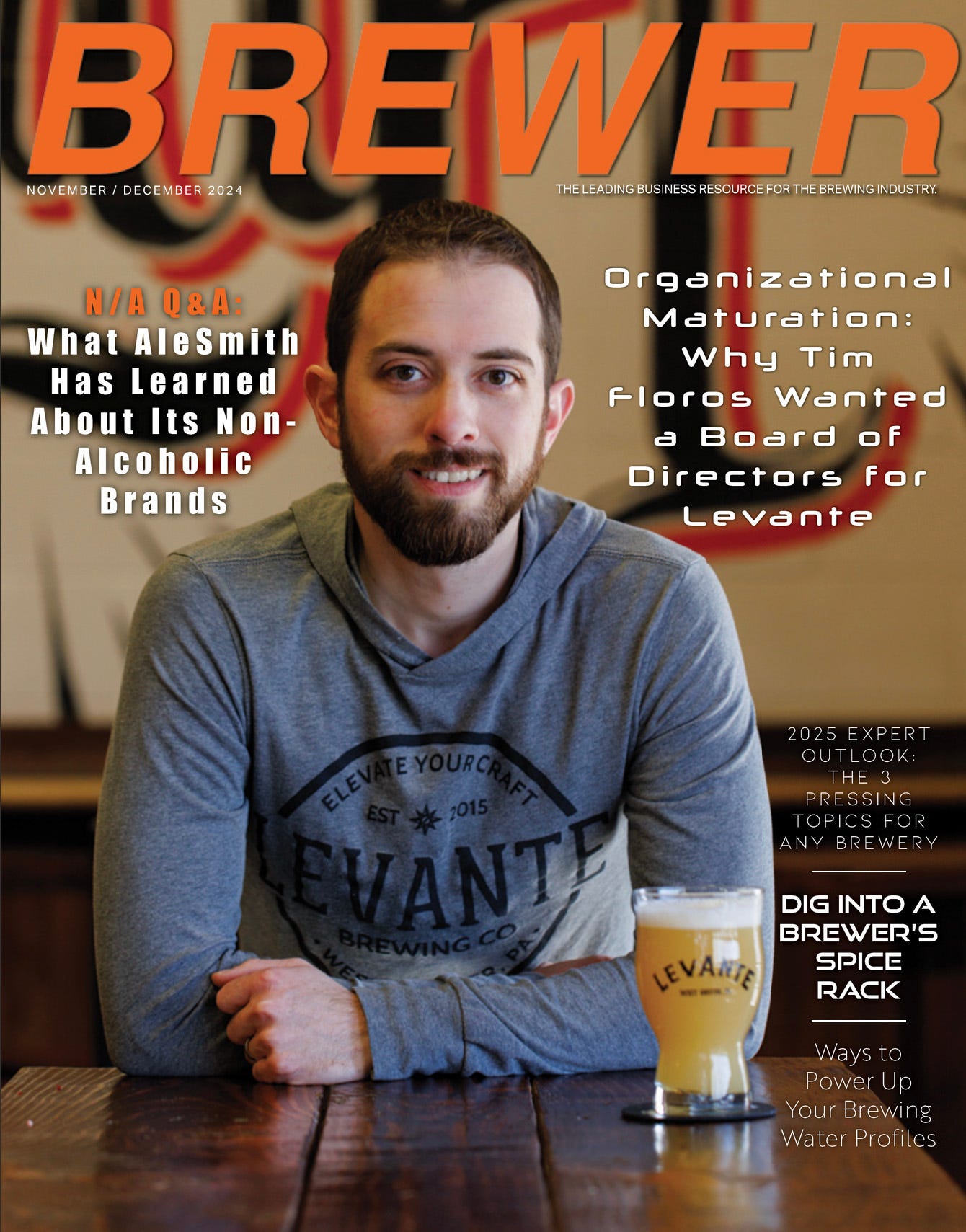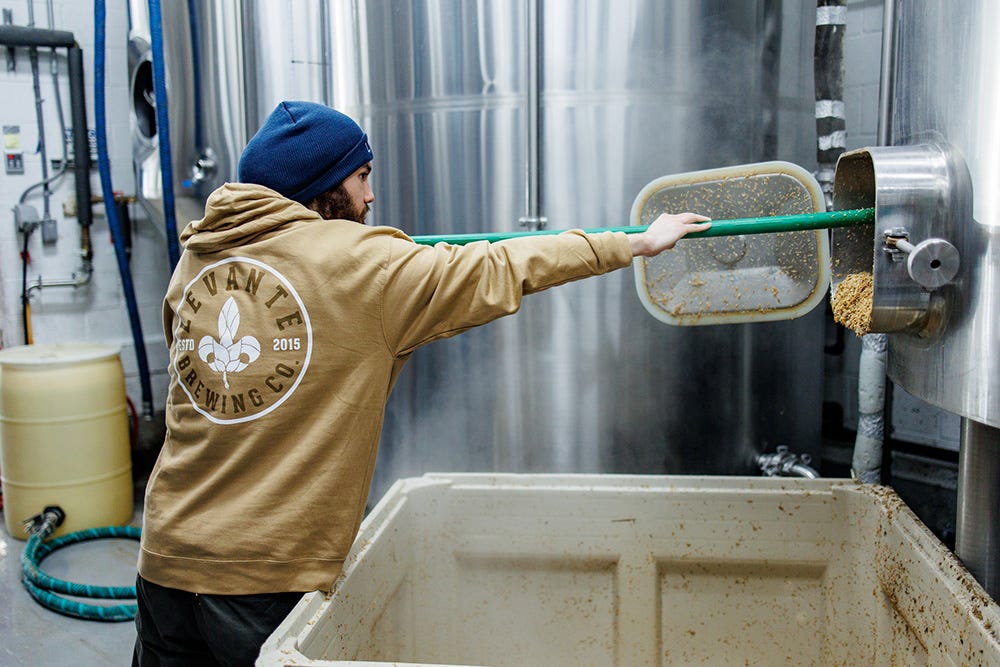Heading into its 10th anniversary, Levante Brewing is right about where co-founder Tim Floros had planned for it to be, with an initial business plan to produce around 10-15,000 barrels in seven to 10 years and being a regional-sized brewery.
How the West Chester, Pennsylvania brewery got to that point, though, is entirely different than what was initially thought of at the launch.
“I could have never predicted how this happened, especially with the pandemic and online sales,” he said. “I mean, regional has different meanings now.”
With the thought of being a packaging and distributing brewery at the offset, the volume game was the idea. However state law changes and the understanding that being a more organized and structured company led to switches for the brewery, located about 35 miles west of downtown Philadelphia.
“When those taproom laws changed and we started to learn the business of beer and how much cash it actually eats up, we're like, whoa, we need to balance this out,” Floros said. “You can't build a business all wholesale if you don't have a ton of capital. And I think that's been the No. 1 thing that we've found.”
There are a lot of ways to build a successful brewery, and probably even more options to tank one. For Floros, it means lots of forward thinking and leaning into the brewery’s Board of Directors to help shape that future for the brand.
“Frankly, our board will sit down and we'll be laying out all the trends. And there's so many different trends, there's so many things to follow,” he said. “But ultimately, from a business principle standpoint, it's important to have a good blend of retail with wholesale revenue and margin.
“It's really controlling our focus, since there's so many options. If we're growing like crazy in wholesale … we really have to make sure we manage and hold that wholesale growth pattern, but not so big that 90% of our business is wholesale and 10% is retail, because you could sell a case of beer from your retail facility for $70 margin but you only sell a case of beer for $7 margin at wholesale. You have to put the wholesale business and retail business in their spots in your business model. So for us, it's responsibly growing in the right ratio, but also growing as rapidly as we can and scale it.”
The bigger you can grow the company without growing fixed costs too much, the more profitable you'll be, Floros explained.
“In the past years as brewers, I think we've seen a lot of down profits because raw material costs are going up, and our labor costs are going up,” he said. “But what you do is you don't grow your sales to meet that typically, you just shrink your margins.
“So retail is important. It can support your growth. Then your wholesale is your unlimited potential.”
Levante opened its doors in 2015 during a pivotal moment for Pennsylvania breweries, as Floro noted when they opened recent law changes that permitted taprooms to serve draft beer directly to customers. That transformed the brewery’s taproom into the central hub of early operations.
“That direct feedback from the customer was really how we got our lineup down to core beers,” Floros said.
That smaller start — focusing on direct interactions with customers and limited self-distribution of kegs to select locations — was a switch for sure. However, by 2018, as customer demand grew, the brewery started canning with a mobile canner for to-go sales. This marked a shift, allowing Levante to establish a reputation in the general Philly area by having specialty release events that attracted hundreds of consumers and sometimes led to sell-outs of a brand in a single night.
These “hype releases,” Floros said, sustained the brewery's momentum, contributing significantly to sales.
“That ‘line life’/release culture — nights when we’d do $20,000-$40,000 in sales — was really how our business ran for a while,” he said.
The 2020 pandemic accelerated Levante’s growth in wholesale distribution as demand surged for canned products. Adjusting quickly to these changes, Levante expanded its distribution capabilities, evolving beyond the initial taproom-focused model. Starting with a distributor, Levante moved into self-distribution, but its popularity grew, putting the brewery back into working with wholesalers to deliver products in-state along with New Jersey, Maryland, Delaware, and DC.
Floros called this phase the start of the brewery’s "adolescent maturity."
“The drinking habits and cultural habits changed so much around the pandemic,” Floros said. “We still talk about it daily because of its impact on our business model.”
Floros went to school at Villanova for entrepreneurship and business administration but also teamed with six others to create the ownership group which includes partners with a variety of skill sets, including sales, finance, IP, a doctor, and a lawyer.
“We got professionals involved and we always knew we wanted to have a professional organization,” he said. But in the beginning, he said the “cool” factor of being a brewery owner making beer did eventually lose its luster.
“Collectively spent millions of dollars getting to where we are,” he said. “If we want to keep this thing going and make it sustainable, and long-term profitable, then we've got to professionalize. We were babies, not super professional.”
As Levante expanded, Floros realized the demands of running a brewery went beyond brewing passion and instinct.
“We’ve grown up over time,” Floros said. “We have HR practices, best practices, and protocols; we have a full-time quality control and safety compliance officer now.”
The brewery’s shift toward established operational and safety procedures was not just about regulatory compliance but also about maintaining high standards as it scaled up.
The decision to bring in a board was driven by Floros’ recognition of his own limitations in certain operational roles. Although he had a business background, he acknowledged that his limits as a CEO have been tested prompting the realization that the company needed not just his vision but a support system to fulfill it.
“What we need is support for you,” he recalled being told in discussions with his staff and working more toward being the face of the company to help growth. In addition to allowing Floros to focus on what he does best, the board’s involvement has introduced a level of discipline and accountability necessary for sustained growth.
Levante’s maturation has also involved reevaluating the roles within the organization. Floros initially followed the common approach of promoting from within, building positions around people rather than around strategic needs. He soon learned the necessity of structuring roles to suit the company’s long-term objectives, even if that meant bringing in outside talent.
“The best thing that I’ve found to do is probably conventional business advice...set the company up the way that you feel it should operate in the market,” he said. “But don’t put any names on your chart.”
This shift has allowed Levante to attract and integrate experts, like bringing in a qualified head brewer instead of having Floros be on the brew deck or having a talented retail person in charge of the taproom instead of trying to balance that workload himself.
Levante’s adaptability has been key to its sustained success over nearly a decade now. The brewery plans to expand beyond West Chester with a new location in Ardmore, Pennsylvania, just outside of Philadelphia. Being closer to the city’s downtown brewery hub, this additional site aims to serve a more urban clientele while maintaining Levante’s reputation as a cornerstone of the West Chester community.
Floros said Levante’s journey is one of constant evolution; being shaped by a blend of passion for craft and hard-earned business acumen.
“Making the best beer profitably and sustainably for growth is a totally different animal,” he said, acknowledging the challenges many breweries face in balancing quality with financial stability.
“We could have probably closed 20 times over the past 9-10 years if it weren’t for retooling and getting back to business basics.”
The board of directors has become a cornerstone for the brewery, not only supporting Floros but also enforcing the business requirements to thrive.
“What we're arriving at in conversation as a growth organization in general — but specifically manufacturing and distribution and sales — there's two really big focuses of ours as we move,” he said. “One is professionalizing the company and learning how to build a disciplined organization.
“The other is resources: things like people, cash … your raw materials, and supplier relationships. Those two groupings become the most important things for growth.”
Building a professional, disciplined organization involves a continuous balancing act. Floros used the term “like flying and fixing the plane at the same time,” but it has ultimately equipped Levante to navigate the challenges of today’s market with both agility and foresight.





